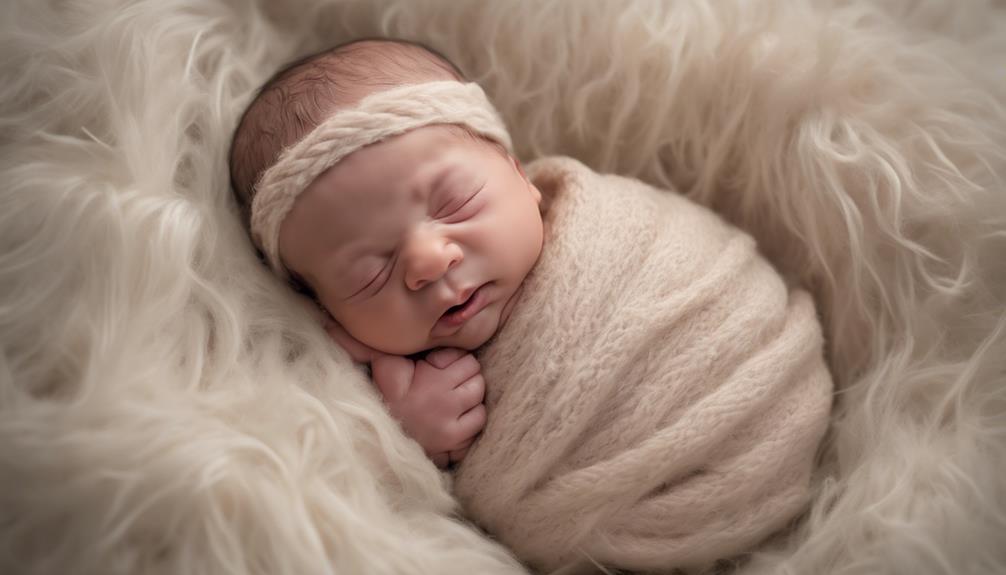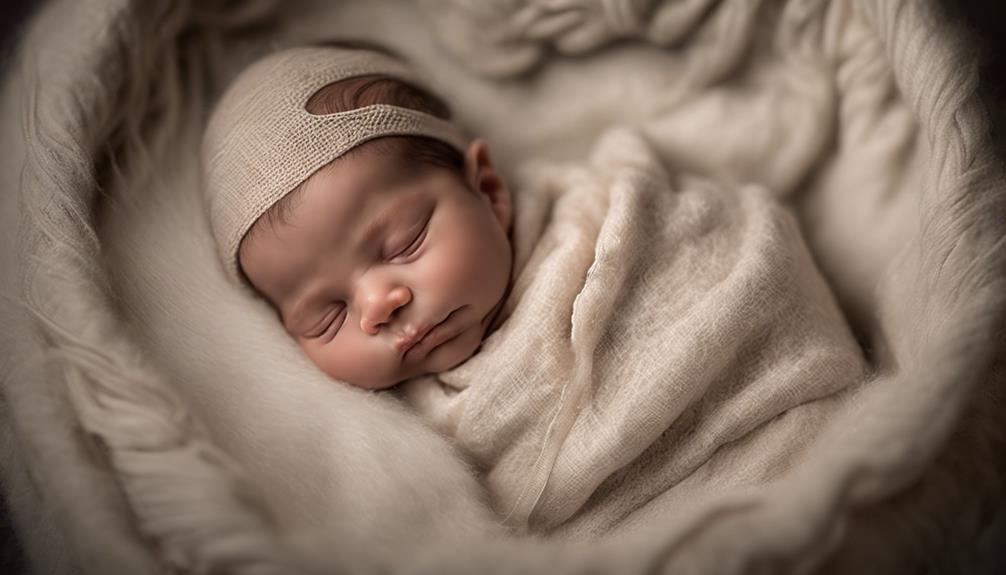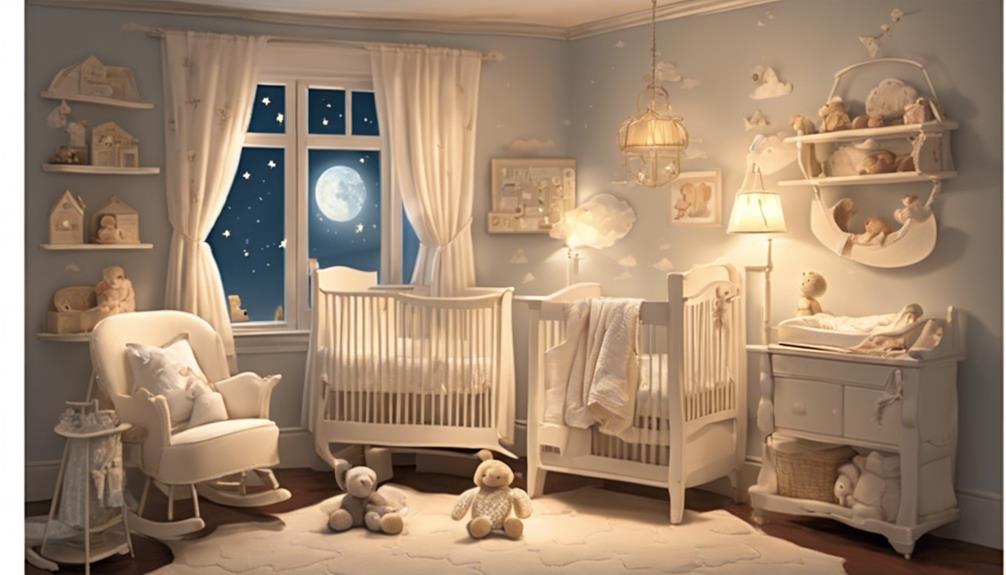As caregivers, we are often attuned to subtle cues that hint at our baby's need for a moment of break. These signs, though easily missed, play an important role in ensuring our little ones' well-being.
Understanding the delicate dance of sleep hints can lead to smoother changes and more peaceful nights for both baby and parent. So, how can we decipher these signals and create an environment conducive to rest without unnecessary struggle?
Let's explore this intricate world of newborn sleep hints and discover the key to a harmonious bedtime routine.
Key Takeaways
- Recognizing newborn sleep cues is crucial for establishing healthy sleep habits.
- Differentiate between sleepy and tired cues to prevent overtiredness.
- Respond promptly to baby's cues to promote better sleep quality.
- Create a soothing environment and consistent bedtime routine for optimal rest.
Importance of Recognizing Sleep Cues
Recognizing sleep cues in newborns is essential for establishing healthy sleep habits and preventing overtiredness. As caregivers, understanding the signs that indicate when a baby is ready for sleep can make a significant difference in their rest and overall well-being.
By recognizing and responding promptly to these cues, we can help prevent overtiredness, which can lead to more significant challenges in getting babies to settle down for sleep. Babies give us cues that they're tired, and it's fundamental to pick up on these signals to guarantee they get the rest they need.
Not only does this promote better sleep quality, but it also aids in brain development, learning, and memory. By being attuned to the subtle differences in sleep cues for different ages, we can create an environment that supports healthy sleep patterns and fosters ideal outcomes for our little ones.
Common Newborn Sleep Cues
When observing a newborn, it's crucial to pay attention to common sleep cues such as staring blankly, turning the face away, yawning, and rubbing eyes. These signs are crucial in recognizing when your little one is feeling tired and ready for rest. Apart from these cues, newborns may also exhibit behaviors like arching their back, pulling their ears, and stretching, indicating their need for sleep. By understanding and responding promptly to these signals, you can prevent overtiredness and establish healthy sleep habits for your baby. Recognizing these signs early on is key to ensuring your newborn gets the restful sleep they need. By being attuned to these subtle cues, you can help your baby shift smoothly into sleep, leading to better overall sleep quality. Here's a helpful table to guide you through some common newborn sleep cues:
| Common Sleep Cues | Description |
|---|---|
| Staring Blankly | Baby appears distant |
| Turning Face Away | Avoiding eye contact |
| Yawning | Baby yawns audibly |
| Rubbing Eyes | Rubbing eyes gently |
| Arching Back | Curving backward |
Signs of an Overtired Baby
To understand when a newborn is feeling overtired, it's important to recognize the subtle signs they may display. Signs that your baby may need a nap include frequent yawning, increased crying, and difficulty soothing despite your best efforts.
Pediatric sleep experts emphasize the significance of recognizing your little one's cues to prevent them from becoming overtired. An overtired baby might exhibit fitful and restless sleep patterns, making it challenging for them to settle down. It's essential to establish a sleep routine based on your baby's cues to help them get the rest they need.
If you notice your baby sleeping at unusual times or experiencing disrupted sleep, it could be a sign that they're overtired. By being attuned to the different types of sleep cues, you can play a pivotal role in helping your baby establish healthy sleep patterns and ensuring they get the restorative rest essential for their well-being.
Responding to Sleep Cues

Understanding and promptly responding to your newborn's sleep cues is essential for fostering healthy sleep habits and preventing overtiredness. It's vital to differentiate between sleepy cues, like yawning and rubbing eyes, and tired cues, such as arching the back, to respond promptly to your baby's needs. Misinterpreting these cues can make it challenging to settle your baby for sleep, affecting their overall rest. By recognizing and responding to these cues effectively, you can establish a soothing environment that aids in your baby's restful sleep. Creating a consistent bedtime routine can also help in reinforcing these positive sleep habits. Below is a table summarizing common newborn sleep cues:
| Sleep Cues | Description | Response |
|---|---|---|
| Staring blankly | Indicates fatigue and potential sleepiness | Prepare for nap or bedtime |
| Yawning | Sign of tiredness | Provide a calming environment for sleep |
| Rubbing eyes | Shows the need for rest | Dim lights and reduce stimulation |
| Stretching | Preparing the body for sleep | Swaddle or cuddle for comfort |
| Pulling ears | Could indicate fatigue | Offer gentle rocking or white noise for sleep |
Helping Newborns Get Quality Sleep

In supporting newborns to achieve quality sleep, we focus on creating a conducive environment that nurtures their restful slumber. Understanding your baby's sleep cues is key to helping them get the rest they need.
Here are some practical tips to assist your little one in getting quality sleep:
- Recognize your baby's sleepy cues: Pay attention to signs like yawning, eye rubbing, or fussiness to identify when your baby is ready to sleep.
- Establish a consistent bedtime routine: Creating a calming bedtime routine helps signal to your baby that it's time to wind down and prepare for sleep.
- Follow appropriate wake windows: Newborns have short wake windows, so make certain they aren't awake for too long between naps to prevent overtiredness.
Conclusion
As we navigate the delicate dance of parenthood, tuning in to our newborn's sleep cues is like deciphering a gentle lullaby sung by our little ones. By recognizing these subtle melodies of tiredness, we can guide them to peaceful slumber, nurturing their growth and well-being.
Let's embrace this harmonious rhythm of rest, weaving a tapestry of sweet dreams and cherished moments with our precious bundles of joy. Goodnight, little ones, may your dreams be as limitless as your potential.









